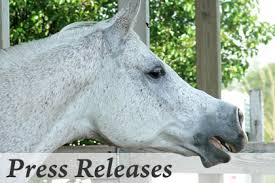Genomics and Infectious Disease
- Posted by Ernie Bailey, MS, PhD
Genomics is probably a lot like the invention of airplanes. My grandfather was born before the invention of manned flight and died years after the moon landings. I once asked what he thought of flight, and he told me flying was just a great way to get from one place to another. Clearly he took it for granted. If we had discussed genomics, I suspect he would have asked, “What’s it good for?”
Genomics (the study of all the genetic material within an organism) has revolutionized genetics for horses. I am impressed, but my students have another perspective. My first-year students were born after the beginning of the human genome project (1990) and were toddlers when we began the Equine Gene Mapping workshop (1995). Rather than having awe for genomics, my students consider DNA tests for coat colors and hereditary diseases to be just plain sensible. No big deal! What’s next? Certainly we have more tests to develop. But frankly, coat color tests are to genomics what wing-walking was to early flight–trivial expressions of an amazing technology.
We do not usually think of genetics and genomics in connection with infectious diseases; however, one of the greatest applications of horse genomics will be for preventing equine infectious diseases. Until now, most infectious disease research focused on the pathogen. There can be no question but that isolating and identifying the pathogen was, and is, of primary importance: When pathogens are found to stimulate the immune system, vaccines might be developed. With the pathogen in hand, scientists can investigate susceptibility to antibiotics or other chemical therapeutics. However, the key piece of information needed to help horses fight disease is to know how horses respond to the pathogen. Until the advent of genomics, we could not effectively investigate horses’ complex response to infection or the tricks pathogens use to evade that response.
Vaccination protects our horses from several serious infectious diseases; however, we have been unable to produce effective vaccines for many diseases. For example, our equine herpesvirus vaccines only produce short-term immunity; equine herpesviruses have evolved a way to block development of long-term protective immunity. Influenza viruses use another strategy. Vaccines for influenza are effective, but only for the strain used to make the vaccine; influenza viruses evade the immune system by rapidly evolving a new genetic and antigenic (producing new virus strains) profile unrelated to that vaccine
Create a free account with TheHorse.com to view this content.
TheHorse.com is home to thousands of free articles about horse health care. In order to access some of our exclusive free content, you must be signed into TheHorse.com.
Start your free account today!
Already have an account?
and continue reading.
Written by:
Ernie Bailey, MS, PhD
Related Articles
Stay on top of the most recent Horse Health news with















One Response
re: Genomics and Infectious Disease
That is the kind of research I can be in favor of. Lets end the other kind where live animals are injured or given diseases and then killed.